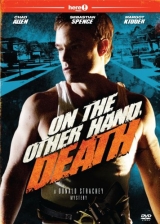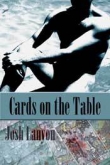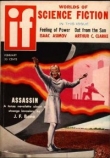
Текст книги "On the Other Hand, Death"
Автор книги: Richard Stevenson
сообщить о нарушении
Текущая страница: 12 (всего у книги 12 страниц)
I hung up. I looked up the address I wanted in Colonie, then took two aspirins. Timmy had brought my car back and left it in its space. Waves of heat rose off it. I could have fried an egg on the hood but wasn't hungry. I opened all the windows, placed the floor mat on the hot plastic seat, lowered myself onto it, and drove out into the midday traffic.
I picked up the Smith & Wesson at my office, as well as the lightweight jacket that covered it, then headed on out Central.
The owner of Murchison's Building Supply Company in Colonie was disinclined to answer my questions, but when I offered him the choice of talking to me or to Ned Bowman, he picked me. Bowman would have to be calling on him anyway, but I didn't mention that.
Then I drove back to Moon Road.
25
• "Hi, Jerry. Your boss says you're feeling under the weather today. Left the office early."
"Oh, hello! It's you! My boss said that?"
"Mind if I come in? I'd like to talk."
"Well . . . Sandra took Heather swimming."
"No sweat. We won't need a chaperone for this. Joey over at Freezer Fresh?"
"No, not till four. He's down mowing Mrs. Fisher's lawn. She called. That was really white of her. Very Christian. Considering."
He made no move to open the door. We spoke through the screen. The sweat ran down his pale face and splashed onto his drip-dry white dress shirt.
"Why don't you come out and we'll sit under a tree and talk?"
"What about? I'm not feeling well, actually. I was just thinking of . . . going to the doctor. Maybe another time, when I'm feeling up to it, okay?"
"Mr. Murchison says you turned over fifty thousand dollars to him this morning."
"Wh-what?"
"The fifty that was actually due last week. The second payment, including sixteen percent interest, that's restitution for the hundred and forty-one thousand you embezzled from Murchison over three years, and which he caught you at in June."
His mouth worked at speaking words. He fought to keep from collapsing, and managed it, barely. I opened the door and he backed away.
"I don't– I want– I need a drink of water," he stammered.
I followed him into the kitchen and watched him gulp
down some tap water from a plastic cup with a picture of two Smurfs on it. He rinsed out the cup and placed it on the drying rack. His mind was working and working.
He turned toward me with a twitchy grin. "I really can't understand why Mr. Murchison told you that story. That was just something between he and I. Jeez. Why would he do that?"
"Where did you get the fifty?" I said.
He kept on grinning, his head moving back and forth, back and forth, trying desperately to look incredulous. "Mr. Murchison said—he told me—he'd keep that between us. I was making good. I made a mistake, but he forgave me, and I was making good."
"If he forgave you, why did he sick Dale Overdorf on you?"
"Who? Dale who?"
"The goon who roughed you up in June."
"Oh. Oh, jeez. He told you about that? You'd think he'd be ashamed." The panic in him was rising and he kept swallowing, but it wouldn't go back down.
"Murchison didn't strike me as being either ashamed or forgiving," I said. "I think he had his reasons for stringing you along and not calling in the cops, and leaning on you at the same time. But you didn't answer my question. Where did you get the fifty that you paid Murchison this morning?"
"I borrowed it," he said weakly, not much conviction left in his voice. Then his face reddened and he slammed his fist at the air. "Anyway, I don't have to tell you anything! This is a private matter between Mr. Murchison and I. Who do you think you are coming in here and delving into my private affairs! Mr. Murchison said he was going to treat the whole thing like a loan, so as far as anybody else is concerned, it's none of your darn business! You come in here and start questioning my integrity
and . . . and you don't have any right! I want you to ... to leave my house right this minute!"
I said, "What did you do with the money you embezzled? There's no evidence of it around here. No steak for supper at the Deem house, just hot dogs. Where did it all go?"
The anger drained out of him in an instant, as if someone had opened an artery. He stood by the sink white-faced and trembling now, dumb with shock, watching me, trying to prepare himself for the moment he'd been terrified of all his adult life. I despised the moment too. But I saw no point in putting it off, so I said the words.
"You spent a hundred and forty-one thousand dollars feeding Duane Andrus's coke habit. That's a lot of money for low-grade sex."
He gawked at me in hot panic for a long couple of seconds. And then he broke. Deem slid to the floor, quaking and weeping, his heaving back banging against the sink cabinet, his face in his hands. Between great racking sobs, Jerry Deem shook his head and keened, "I'm not a homo! I'm not a homo!"
I seated myself on a kitchen chair and gazed out the window at the immobilized T-bird. Not looking at Deem, I said, "The kidnapping wasn't your idea, was it?"
"No, no, I wouldn't have done that."
"But Andrus told you about it as soon as he'd done it. And you didn't turn him in. If you had, you might have saved Peter Greco from drowning in a sea of cat fur."
He sobbed and nodded and shook his head.
"Andrus wanted you as an involuntary accomplice to gain a further hold on you, because he thought that Dot Fisher would sell out to Millpond to raise the ransom money and make everybody on Moon Road rich. When Dot threw a crimp into that plan by raising the hundred grand through other means, Andrus decided to kidnap
McWhirter too—none of us knew yet that Greco was dead—and put additional pressure on Dot to sell. That way, Andrus would end up with the ransom money and whatever he could extort from you after the sale of your property went through.
"One reason you went along with it was—besides your fear of Andrus's exposing your relationship with him—the other reason was, you wanted part of the ransom money to pay off Murchison, who was pressing hard for his August installment and threatened to send Dale Overdorf around again to break your collarbone. Two busted collarbones in one summer would have been hard to explain to your family and friends."
He sobbed and nodded, nodded and sobbed. I looked down at him. My head hurt. I felt sick.
"Why, Jerry? I understand the two-life syndrome. Like a lot of people, I once lived that way myself. I understand the terror that drives men to it. But why Duane Andrus? Why some violent punk like him? There are two billion men on the face of the earth. Why Andrus?"
He peered up at me now, still shaking, his face awash with sweat and tears. After a long, tense moment, he said angrily, "Because he was evil. I am an abomination unto the Lord! Duane Andrus is what I deserved."
We sat gazing at each other. If Fenton McWhirter had been there he would have attempted to explain a few things to Deem. But I had neither the stomach for it nor any hope that it would make a difference to anyone living.
Breathing more easily now, Deem said, "I think– I guess I better have a Valium. I need to calm down."
I nodded.
He managed to stand and wobble into the living room, then staggered left into the rear part of the house.
After a moment, I stood and walked quickly in the direction Deem had gone. The bedrooms were empty. A
door in the short hallway was shut. I knocked. He didn't answer. I tried the knob. Locked.
In an instant, I made a decision I sometimes later regretted. I lifted a leg and sent my shoe crashing hard against the flimsy plywood door. It exploded inward, knocking Deem against the sink, the battery of pills flying out of his mouth and pinging against the mirror like buckshot. He flailed about, grabbing for the pills, but I had him by the collar and dragged him into the living room backwards.
Then to the kitchen, where I bent him over the table and held him there with one hand while I dialed the phone with the other. I glanced at my watch while I dialed. Five after two. There was just enough time. I had another appointment to keep.
26. As I drove Dot Fisher up Moon
Road, we passed two Albany police cruisers and Bowman's blue Dodge parked in front of the Deem house. She asked if I knew what was going on there, and I told her. She was silent for a long time. Then she said, "I'll drop in on Sandra later. She'll probably be needing some help."
We met Dot's attorney in the refrigerated lobby of the Millpond building and rode up together to Crane Trefusis's office. Marlene Compton ushered us into Trefusis's aerie of cool brown sunlight at exactly three o'clock. Dot was wearing electric blue slacks that clashed with the buffs and rusts. Trefusis removed his shades and greeted us with the bemused serenity of a man who knew that, overall, he would get what he wanted.
"Nice of you to drive all the way over here," he said. "I would have been more than happy, of course, to send one of our people out to Moon Road to pick it up."
Dot opened a Price Chopper paper bag and dumped the dollars on Trefusis's desk. "I wanted to present this to you myself," she said. "Please count it."
Trefusis laughed lightly. "No need for that. I know an honest woman when I meet one."
The lawyer produced a document canceling Millpond's option on Dot's property. Dot and Trefusis signed copies of it. Then Trefusis handed over a receipt for the hundred thousand.
"Nice doing business with you, Mrs. Fisher," he said. "Even under these sad and unproductive circumstances."
Dot mumbled something, started to leave the office, then turned and looked back at Trefusis. "I feel sorry for your mother, if she's living," she said. "You're going to make a lot of money, Mr. Trefusis. But otherwise you're not going to amount to much."
The lawyer looked embarrassed and followed Dot out the door. I yelled after them, "I'll meet you in the lobby in ten minutes."
When the door closed, Trefusis said, "Funny old gal. I guess their minds go after a while."
I said, "The reward money. Ten grand. It's mine."
He stuck the stem of his shades in the corner of his mouth and studied me. He said, "That was for bringing Peter Greco back alive. You failed."
He was right. I didn't argue. My impulse was to break his nose, but my head hurt. I now owed Whitney Tarkington a hundred and ten thousand dollars. Fifty thousand had been recovered from Duane Andrus, and Trefusis's fee for catching the graffiti vandal would cover another ten. I still had to come up with an additional fifty thousand dollars by the next afternoon. Timmy was good
for five, and my bank would, at 15 percent interest, make up the rest. Quite a weekend.
Trefusis was blathering on about how tragic the whole affair had been, but how Dot at least was going to be able to keep her beloved farm, and Trefusis had his eye on some acreage being offered for sale at the Christian Brothers retreat area, and in the end everything was going to work out all right for everyone concerned.
"Except for Peter Greco," I said. "And Fenton McWhirter, who's alone now."
"It's unfortunate," he mused. "But it's no one's fault. Not you, not I. A tragic, tragic accident. None of us is to blame."
I told him about Jerry Deem. He went white.
I said, "You knew."
"That's absurd!" he blurted, with no conviction whatever.
"Your pal Murchison, a Millpond partner and chief supplier of construction materials for Millpond projects, mentioned to you in June that he had an accountant with his hand in the till and the authorities were going to have to be called in. When you found out the financial sleight-of-hand artist was the one and only Jerry Deem, you suggested to Murchison that there were other ways of handling it. In fact, you insisted on it. You offered Murchison Dale Overdorf."
His cheek twitched.
"You didn't want to unleash Overdorf on Dot Fisher directly," I said. "You knew how stubborn she was and how much public sympathy would be aroused by the beating of an old lady. If it ever somehow got traced back to you, Millpond would suffer bad PR, bad enough maybe to fatally unravel the deals you had with the planning boards and environmental agencies. But Jerry Deem was another matter, wasn't he?"
Twitch, twitch.
"You could put all the pressure you wanted on Deem without having to worry about his blowing the whistle, and then hope that he would come up with the means, of whatever gruesome sort, for persuading Dot to sell. It nearly worked. Deem, by way of his alternating threats and promises to his family, inadvertently, or advertently, triggered his son Joey into menacing Dot with the graffiti and threatening letters and phone calls. And by Deem's holding out lurid promises of vast wealth to Duane Andrus as soon as Dot Fisher folded and Deem sold his property to you, the kidnapping and death of Peter Greco were set in motion."
His jaw was so tight I thought it might shatter if I touched it. But I'd decided to deal with Trefusis's jaw later, whenever my head stopped throbbing.
"You didn't count, of course, on matters becoming quite so messy as they did," I said. "When you brought me in, the only sacrificial lamb in all of this was supposed to have been Joey Deem. You must have guessed that he was the graffiti artist, and I was to nab him and earn Millpond's goodwill from Dot, who would gratefully relent and sell out, and Joey Deem would get a slap on the wrist as a juvenile offender.
"Except, you blew it, Crane. There was a side of Jerry Deem's life you didn't know about. You didn't check him out well enough and find out just how damaged and volatile a human being you were lighting a fuse under. Deem was more canny and driven in his efforts to cover up certain of his ongoing socially embarrassing affairs than you'll ever dream of being. You found out he was unstable and vulnerable, but not how unstable he was, and that he was beholden to people who were absolutely batty. Murderously so, as it happened. You fucked up, Crane. Royally. As befits your position in what passes for aristocracy in Albany."
He studied me for a long moment, his face frozen in
white rage. Then he spoke. "You're going to the D.A. with this bullshit story?"
"Yep."
A tight little grin. "It'll be laughed out of court. I'll deny it. Murchison will deny there'd ever been an embezzlement. Deem will be certified insane. The judge will chastise you and your faggot friends for wasting the taxpayers' money."
"Could be," I said, getting up. "But you'll get your name in the papers, Crane. Every day for six months. You and your company. So, if you're going to build a shopping mall on the Christian Brothers' land, you'd better do it in the next forty minutes."
He twitched some more as I walked out.
Marlene Compton chirped, "Have a nice day."
In the ways that counted, I did.
Epilogue Crane Trefusis survived five months in Albany before being dismissed by Millpond and fleeing to Wichita, his wife's hometown, where he became manager of a J. C. Penney's store. Just before his departure, I walked into La Briquet and knocked him across his table into a chocolate walnut souffle being served to the speaker of the New York State Assembly. Trefusis's jaw collided with a silver bowl and shattered. He pressed charges. I was fined five hundred dollars, put on six months' probation, and just barely kept my license. Bowman loved it.
As a result of the outrage generated by Peter Greco's death, Fenton McWhirter signed up eleven additional men and women for the gay national strike before moving
up to Burlington, Vermont, for a recruiting effort there. Greco was cremated and his remains carried across the nation in McWhirter's backpack, and later scattered over the Pacific, like Harvey Milk's. At a memorial service in the Albany Gay Community Center, Dot Fisher talked about Peter's resiliently gentle ways; Edith was at her side, though she'd worn a veil over her face while entering the building.
No shopping mall was built on Moon Road. A small commercial establishment did, however, spring up at the corner of Moon and Central. On Labor Day weekend I stopped at the spot, where Dot Fisher and Kay Wilson were helping Heather Deem run a refreshment stand. The sign read, moon road plaza associates —kool-aid 25 cents.
One unseasonably warm September night, Timmy and I put Lyle Barner on a bus for San Francisco, armed with a citation of merit for his role in the capture of the Andruses. I heard later that he was living in Daly City, California, and was married to a forty-six-year-old divorced woman with six children—though this might have been gossip spread by Ned Bowman hoping that it would reach me and set an example. If so, it was an example I did not consider following.
Three days after Lyle left town, Timmy and I joined Dot and Edith for a feast of roast duck and Dot's famous elderberry cheesecake to celebrate Edith's seventy-sixth birthday. Afterwards, on the way back to the apartment, Timmy said, "Dot and Edith are quite a pair. All that love, devotion, emotional simplicity, repose. It leaves an impression."
"On me too."
"That's us, thirty years from now," he said. "With luck."
"It's what I want," I made myself say.
We were heading across Washington Park, which smelled moist and hot and alive.
"In the meantime," Timmy said, "why don't you swing down by the lake? Maybe we can pick up a couple of humpy SUNY students and take them over to our place for a wild foursome."
I swerved, straightened out, then glanced over at him to see if he was grinning and shaking with mirth. He was. As we continued on across the park and out onto Madison, I glanced at him a couple more times.
"Just testing you," he said brightly.
I said, "I'll bet," taking a quick look back toward the park, and he laughed again.
It was going to be a stimulating thirty years.








